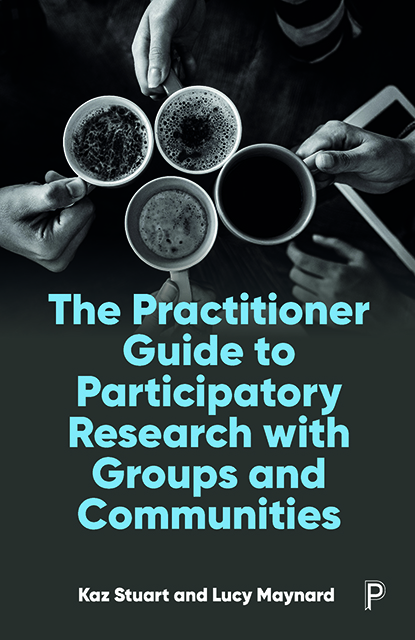Book contents
- Frontmatter
- Contents
- List of Figures and Tables
- Glossary
- About the Authors
- Acknowledgements
- Foreword
- Foreword
- Introduction
- 1 Just What is Participatory Research?
- 2 How do We Begin to Plan Our Participatory Research Project?
- 3 What Do We Want to Explore and Why?
- 4 What Ideas are the Foundations of Our Research?
- 5 How Will We go About Exploring Our Questions?
- 6 Who Can Get Involved to Explore Our Questions?
- 7 How Shall We Collect Our Data?
- 8 What Do We Do With Our Data?
- 9 How Do We Get Our Messages Out There?
- 10 How Do We Keep Everyone Safe?
- 11 Doing and Reviewing Participatory Research
- Conclusion
- References
- Index
7 - How Shall We Collect Our Data?
Published online by Cambridge University Press: 21 June 2023
- Frontmatter
- Contents
- List of Figures and Tables
- Glossary
- About the Authors
- Acknowledgements
- Foreword
- Foreword
- Introduction
- 1 Just What is Participatory Research?
- 2 How do We Begin to Plan Our Participatory Research Project?
- 3 What Do We Want to Explore and Why?
- 4 What Ideas are the Foundations of Our Research?
- 5 How Will We go About Exploring Our Questions?
- 6 Who Can Get Involved to Explore Our Questions?
- 7 How Shall We Collect Our Data?
- 8 What Do We Do With Our Data?
- 9 How Do We Get Our Messages Out There?
- 10 How Do We Keep Everyone Safe?
- 11 Doing and Reviewing Participatory Research
- Conclusion
- References
- Index
Summary
Chapter overview
This chapter provides an overview of common data collection tools and details the tools that are particularly good at promoting participation. We will discuss the tensions inherent in ‘training’ co-researchers in a range of data collection tools in order for them to best decide what to use and suggest a range of resources you might need to support their training.
What are data collection tools?
A toolbox usually has a range of different tools inside such as hammers, spanners, wrenches and pliers, all designed for a specific job. Sometimes you get different sized tools for different sized tasks, for example sledgehammers for heavy building work and small hammers for hanging pictures. Researchers also have a toolbox with a range of practical ways to collect data. Just like the physical tools, data collection tools are all designed for different types and sizes of job. The term data collection tool therefore just refers to a way of collecting data. Every physical tool and data collection tool will have a range of advantages and disadvantages which help you decide which job it is best suited to.
This chapter will look at some common data collection tools, discussing their uses, advantages and disadvantages and design considerations. Because each data collection tool has so many variations, the discussion will be very general, providing a simple overview. You may need to do some more reading, hence the more extensive list of further reading at the end of this chapter.
Common data collection tools
When we ask new groups of co-researchers ‘what is research?’ and ‘what do researchers do?’ we are usually told they do experiments and surveys. This gives us an insight into the most visible forms of research in Western society. It is highly unlikely you will be doing a scientific experiment with your co-researchers, so we will start with surveys as one of the most common forms of research we encounter in our daily lives.
Surveys
Surveys allow researchers to collect data from a large number of people in a controlled and practical manner. Surveys might be conducted on hard-copy printouts, online or verbally in person.
- Type
- Chapter
- Information
- Publisher: Bristol University PressPrint publication year: 2022



